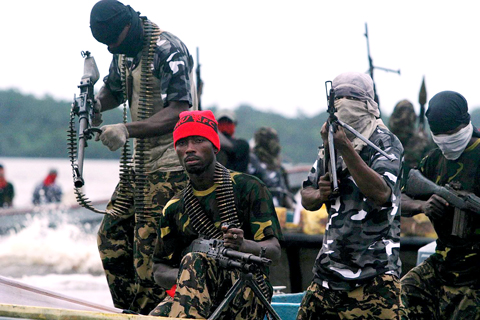Nigeria’s main armed militant group said yesterday it had destroyed a major pipeline run by Royal Dutch Shell in the sixth such attack in the past week as it vowed to paralyze the key oil sector.
The Movement for the Emancipation of the Niger Delta (MEND), the main group fighting for a greater share of southern Nigeria’s oil wealth for local people, said the attack took place on Friday on a “major pipeline” in Rivers State.
It said the pipeline was located at Buguma Front in the Asari Toru region and was the latest target of the “oil war” it launched on Sunday and has nicknamed “Hurricane Barbarossa.”

PHOTO: EPA
“The military and the government of Nigeria whose unprovoked attack on our position prompted this oil war are no match for a guerrilla insurgency of this kind,” it said.
MEND yesterday vowed to “continue to nibble every day at the oil infrastructure in Nigeria until the oil exports reach zero.”
Earlier last week, Shell confirmed the first attack on its Alakiri flow station and a second on the Greater Port Harcourt Swamp Line, both on Monday.
As the week went on it became more tight-lipped, neither confirming or denying claims of attacks on its Orubiri flow station, Rumuekpe pipeline and another pipeline at the Elem-Kalabari Cawthorne Channel axis in Rivers state.
Chevron meanwhile has confirmed two “shooting incidents” near its facilities while saying it has no reason to believe it was specifically targeted in either attack. MEND, which has cut Nigeria’s oil output by more than one quarter since it first emerged in 2006, on Sunday declared “war” on the oil industry, in what it said was a response to an attack by the Nigerian army on its positions. It has threatened to spread its raids to neighboring states.
On Wednesday, in a rare daylight attack, MEND said it had blown up a major pipeline, which it said it believed belongs to Shell and to Agip of Italy.
One of the main grouses of MEND is that the oil wealth of Nigeria, one of Africa’s top petroleum exporters, is basically enjoyed by the federal government and only a fraction of it trickles down to the locals.
It also accuses oil companies of damaging the environment.
MEND spokesman Jomo Gbomo claimed yesterday to have grassroots support.
“The impoverished and neglected inhabitants of oil producing communities consider our actions to these structures as good riddance to bad rubbish,” he said.
“Oil exploration has brought only pain to them by way of environmental damage [farmlands, fishing and wild life sanctuaries], harassment from the military and rape of under-aged girls by soldiers, extra-judicial killings of young men and development and wealth to other parts of the country at their detriment,” Gbomo said.

When Shanghai-based designer Guo Qingshan posted a vacation photo on Valentine’s Day and captioned it “Puppy Mountain,” it became a sensation in China and even created a tourist destination. Guo had gone on a hike while visiting his hometown of Yichang in central China’s Hubei Province late last month. When reviewing the photographs, he saw something he had not noticed before: A mountain shaped like a dog’s head rested on the ground next to the Yangtze River, its snout perched at the water’s edge. “It was so magical and cute. I was so excited and happy when I discovered it,” Guo said.

TURNAROUND: The Liberal Party had trailed the Conservatives by a wide margin, but that was before Trump threatened to make Canada the US’ 51st state Canada’s ruling Liberals, who a few weeks ago looked certain to lose an election this year, are mounting a major comeback amid the threat of US tariffs and are tied with their rival Conservatives, according to three new polls. An Ipsos survey released late on Tuesday showed that the left-leaning Liberals have 38 percent public support and the official opposition center-right Conservatives have 36 percent. The Liberals have overturned a 26-point deficit in six weeks, and run advertisements comparing the Conservative leader to Trump. The Conservative strategy had long been to attack unpopular Canadian Prime Minister Justin Trudeau, but last month he

Chinese authorities said they began live-fire exercises in the Gulf of Tonkin on Monday, only days after Vietnam announced a new line marking what it considers its territory in the body of water between the nations. The Chinese Maritime Safety Administration said the exercises would be focused on the Beibu Gulf area, closer to the Chinese side of the Gulf of Tonkin, and would run until tomorrow evening. It gave no further details, but the drills follow an announcement last week by Vietnam establishing a baseline used to calculate the width of its territorial waters in the Gulf of Tonkin. State-run Vietnam News

PROBE: Last week, Romanian prosecutors launched a criminal investigation against presidential candidate Calin Georgescu accusing him of supporting fascist groups Tens of thousands of protesters gathered in Romania’s capital on Saturday in the latest anti-government demonstration by far-right groups after a top court canceled a presidential election in the EU country last year. Protesters converged in front of the government building in Bucharest, waving Romania’s tricolor flags and chanting slogans such as “down with the government” and “thieves.” Many expressed support for Calin Georgescu, who emerged as the frontrunner in December’s canceled election, and demanded they be resumed from the second round. George Simion, the leader of the far-right Alliance for the Unity of Romanians (AUR), which organized the protest,